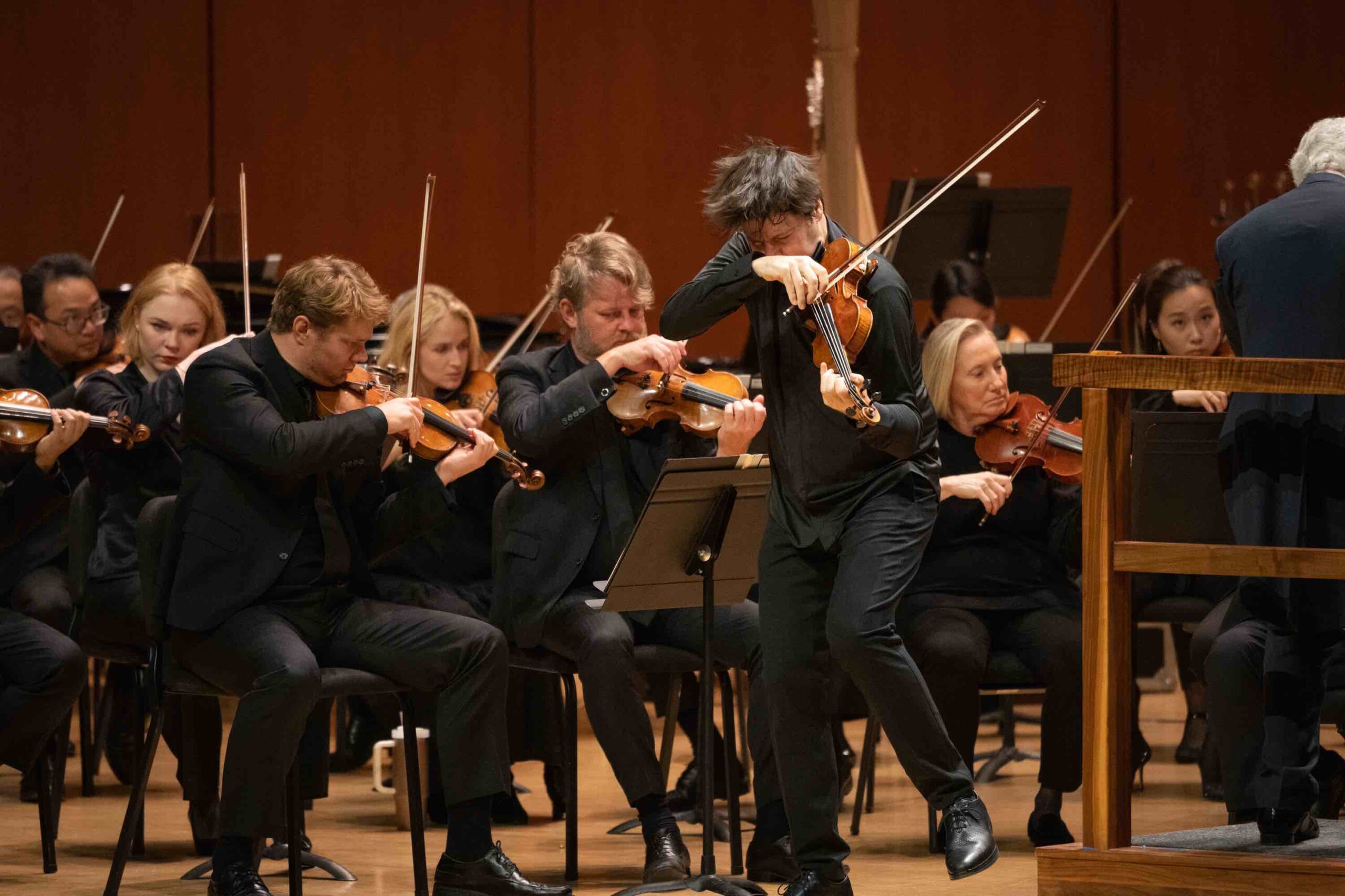World renowned violinist and long recurring Atlanta Symphony Orchestra guest soloist Joshua Bell took the stage at Symphony Hall on Wednesday for another crowd-pleasing foray into works both old and new. It was a surprisingly restrained evening that favored melodic warmth over virtuosic abandon. For Bell, ever the charismatic soloist, this made for some soaring highs and a couple of unfortunate stumbles before he found his footing.
In addition to Bell’s familiar presence, the evening featured guest conductor Peter Oundjian, the current principal conductor of the Yale Philharmonia and music director of the Colorado Music Festival, and he opened with “Vltava” from Bedrich Smetana’s Ma Vlast.
Oundjian’s conducting style is minimalistic and unadorned. Some conductors motivate their ensembles with exaggerated theatrics while others offer only slight and incidental visual information. Oundjian is the latter, and the result is an orchestra that leans into itself to rely on mutual support and internal cohesion rather than external guidance.
That cohesion was very much on display when the billowing woodwind arpeggios that define “Vltava” cascaded skillfully into the suddenly thundering bass and cello section midway through the piece. It is a treacherous moment in the work, and one that can derail the piece in the hands of a less capable orchestra, but here it felt daring and intimate. Oundjian’s willingness to step back and loosen the leash gave what would have been an otherwise languid evening a sense of vulnerable immediacy for players and audience alike.

Bell emerged to thunderous applause and started with Max Bruch’s Violin Concerto No. 1 in G Minor. The piece is a legendary mainstay among violin soloists (to such a degree that Bruch himself came to loathe hearing it), but it proved to be shaky ground for Bell. His tone on the opening allegro moderato was shrill and hollow to the point of discomfort. It made what should have been haunting, meaningful tones into a series of jarring auditory razor blades.
Bell fared better on the adagio, where he could drift languidly through the violin’s middle register and get lost in dialogue with the orchestra. The concerto as a whole is focused on gentle, deliberate melodicism and as such this unadorned midsection is its heart. Bell seemed aware of that and made a thoughtful, redemptive return to form. By the closing third movement, he seemed to have fully come back into alignment with the concerto’s vision.
The centerpiece of the evening was Bell’s original collaborative work The Elements, for which he’d commissioned four different composers to write pieces based around the four elements. Three of the pieces — “Earth” by Kevin Puts, “Water” by Edgar Meyer and “Fire” by Jake Heggie — were performed, and it was here that Joshua Bell the artist was on proper display.
“Earth” was the most fascinating of the three, with its softly pulsating opening strains that echoed the minimalist works of modernist composers like Arvo Part and Max Richter. The piece built slowly from that dreamy opening through a warm crescendo into moments of joyous, lively energy before settling back down into its original soporific calm. It was clear that the “Earth” in question was the planet itself going through a cycle of dawn, daylight, evening and night. The take was a gently thrilling ride akin to Vivaldi’s The Four Seasons or Mussorgsky’s Night on Bald Mountain.

“Water” relied heavily on atmospherics — to the point of including an indigenous rain stick — but generally treaded on more wistful, melodic ground akin to the Bruch and Smetana works that had established the evening’s tone. Here again was Bell playing to his strengths on the instrument’s midrange in a piece that was carried as much by the wider orchestra as by the soloist. Once again, the piece was a sort of musical onomatopoeia that captured in sound the rolling of oceans, the gentle crashing of waves and the distant downpour of rain showers.
“Fire” was the most predictable piece of the lot. Obvious comparisons could be drawn to “Mars” from Gustav Holst’s The Planets and Richard Strauss’ Also Sprach Zarathustra. Essentially, anything and everything bombastic and hellish was on full display: thundering, militaristic percussion, passionate stabs of diabolical fury and spiraling diminished chords. While the piece was certainly enjoyable, it seemed trite in a set of works that had heretofore relied on innovation and fresh ideas.
The ASO, minus Bell, closed out the evening with Nikolai Rimsky-Korsakov’s Capriccio Espagnol. Principal violinist and concertmaster David Coucheron attacked the solo with a rugged, street fighting tenacity that stood in noticeable contrast to Bell’s pronounced elegance. The piece was met with a final eruption of enthusiastic applause from the near capacity crowd.
All in all, it was a pleasant evening punctuated by moments of captivating creativity. Bell may have stepped out on shaky ground, but The Elements won the day. Hopefully he’ll return with all four of them at some point.
::
Jordan Owen began writing about music professionally at the age of 16 in Oxford, Mississippi. A 2006 graduate of the Berklee College of Music, he is a professional guitarist, bandleader and composer. He is currently the lead guitarist for the jazz group Other Strangers, the power metal band Axis of Empires and the melodic death/thrash metal band Century Spawn.

